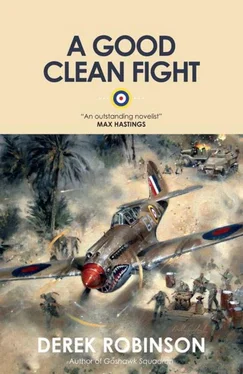“Nothing’s wrong.” Gibbon had his binoculars on the bomber. “It’s just that your average Heinkel 111 has half-a-dozen guns pointing in various directions. I could drive up, you could demand surrender, we could all be dead in ten seconds.”
Lampard took the binoculars. “I don’t see any guns,” he said. “Get closer.”
They advanced cautiously to within half a mile, then a quarter of a mile. Now it was plain that the Heinkel’s gun turrets were empty. “Wait here,” Lampard said. He took a tommy-gun and walked forward. The air was pleasantly cool, and he felt fresh and strong.
The fuselage door was open. He looked inside and saw three men sleeping on the floor. This was a strange situation for Lampard; usually when confronted with the enemy, asleep or awake, he killed them without delay. Now he intended to capture them, but first he would have to wake them up. What to say? Wake up seemed civilian, almost suburban. Hdnde hoch! smacked of the cinema. You are my prisoners was awfully formal, and they might not understand English. While he was worrying about it, one man raised his head and stared. It was Paul Schramm. Lampard flinched with shock.
“Jack Lampard,” Schramm said. The other two men awoke. “I don’t suppose you’re alone,” he said.
“Of course I’m not bloody alone.” Lampard was struggling to catch up.
“One never knows with you chaps.” Schramm heaved himself up and rested on an arm. “You lead such irregular lives. Any chance of some breakfast?”
“You’re very frisky,” Lampard said, “for a prisoner-of-war with a gammy leg and no boots.” They both laughed, very briefly.
“Well, you know me,” Schramm said. “I try to enjoy my war.”
“So you should. What else can you do with it?”
Schramm pulled on his flying boots and spoke to the others. They all got out, and he introduced them to Lampard. “He’s frightfully nervous,” he told them, in English. “He may shoot you, just to calm his nerves.”
By now the trucks had arrived. The prisoners were searched, and the Heinkel was searched, and no weapons were found.
“Breakfast,” Lampard decided.
“The food is awfully good here,” Schramm told di Marco in English. “Except for the tea. My advice is to avoid the tea.”
“Cheeky bugger!” Smedley said.
“Take that man’s name, sergeant,” Schramm said; but his remark caused a sudden silence and stillness. He looked around for the cause, and saw no sergeant. “Ah,” he said. “My apologies.” They got on with their jobs.
“What was that about?” the pilot asked.
“Death in action. They must have suffered losses. I said something rather thoughtless.”
“You seem on good terms with that tall officer,” di Marco said.
“We have a lot in common. He bombed our best aircraft, I killed one of his best men.” Schramm immediately felt slightly ashamed. Killing was nothing to brag about. “I’ll tell you later,” he said. “There will be plenty of time for conversation, I’m afraid.”
The patrol knew how to cook quickly. Bacon, sausages, potatoes, mixed vegetables, all went into one great fry-up and then were spooned into mess tins. They all ate standing up. There was biscuit, margarine and jam for those still hungry. Everyone was. In a very few minutes the meal was finished, the equipment reloaded, the trucks restarted.
Lampard took a sack of bombs from a truck and beckoned to Smedley. “You deserve a treat,” he said. “Five-minute fuses.” Working together, they planted bombs in the cockpit, on the wing-roots, inside the fuselage, on the tailplane. “If only they were all as easy as this,” Lampard said.
“If only.” Smedley’s voice was as flat as the desert. “I know what you’re thinking,” Lampard said. “Why you? Why me? Why are we alive when they’re dead?” That was not what Smedley was thinking, but he said nothing. “It’s not your fault,” Lampard said, “and you have no cause to feel guilty.” Smedley did not feel guilty, and the words made him stare. “Think of it this way,” Lampard said. “War is like boxing. If you want to hit the other man really hard, you’ve got to get close enough so there’s a risk he’ll hit you. See what I mean?”
“He hit us yesterday all right,” Smedley said. “By Christ, did he hit us.”
The trucks moved off to a safe distance and everyone watched except the pilot. The bombs on the wing-roots exploded first. The wings detached, taking the undercarriage with them, and the bomber fell on its belly. The nose exploded, the tail got blown to pieces, the fuselage was shattered. When the pilot looked up there was nothing to see but a patch of smoke drifting away.
“Kufra,” Lampard told Gibbon. “And quite quickly, please.”
Gibbon led. Lampard drove the second truck. He had asked Schramm to sit beside him. “Tell me,” he said, “what have you been up to since we last met?”
“Oh… work. Shuffling… um… what do you call it? Bumf? Is that right?” Lampard nodded. “Routine stuff,” Schramm said. “Mainly what it consisted of was going around sweeping up after your chaps.”
That pleased Lampard. “I’m afraid we are a bit untidy,” he said.
“Yes.” Schramm made his voice wooden. “Yes… Well, I grew rather tired of that, so I organized a trip down to Fort Lamy.”
Lampard thought he had misheard. “Fort Lamy?” he said. Schramm nodded. “That’s in Chad,” Lampard said. “Isn’t it?”
“What’s left of it is in Chad. We bombed it.” Schramm spoke modestly, but the words gave him enormous satisfaction.
“You bombed Fort Lamy?”
“Yes. We blew up twenty-three new Hurricanes.”
Lampard was silent, while he tried to take it all in. Then he said: “You flew to Chad and back. For God’s sake, that’s a colossal distance!” When Schramm merely smiled and shrugged, he said, “I can’t believe it. How far is it?”
“About three hundred kilometers too far, I’m afraid,” Schramm said wistfully.
That killed the conversation for a few miles. The desert was blank: the only thing that moved was the other truck, and its shape and size never changed. There was nothing to do but drive and think.
“By the way,” Schramm said, “Mrs. d’Armytage has moved to Alexandria.”
“Hey!” Lampard protested. “That’s below the belt.”
“Is it? I thought you would prefer to know. It might avoid disappointment when you got to Cairo.”
“Blast your eyes.” Lampard scowled at the dust from Gibbon’s wheels until he realized his right foot was thrusting harder and harder. He relaxed it and the truck dropped back. “Why Alexandria?” he demanded.
“The military police were a nuisance.”
“Oh.”
“Never mind. The Australian is buried now.”
“Uh-huh.”
“The latest information I have is that Mrs. Challis is free and—”
“Pack it in! Look, you stay out of my love-life and I’ll stay out of yours.”
Schramm looked out of the window. “The strange thing is that you made my love-life happen. I cut my feet so badly running away from you on the Jebel that I needed treatment and she was the doctor.”
“I don’t want to hear about it,” Lampard said.
“The war brought us together and now the war has broken us up,” Schramm said. “Long live the war.”
“I don’t care,” Lampard said. “I don’t care about Joan d’Armytage or Elizabeth Challis or your lady doctor or anyone else. All I care about is my patrol.”
“What patrol?” Schramm asked. “Where?”
“Shut up or I’ll bash you.” The right foot went down so hard that Schramm’s head was jerked back. He shut up.
* * *
Barton had had all night to think about this job, and he had changed his mind about the way it should be done.
Читать дальше












